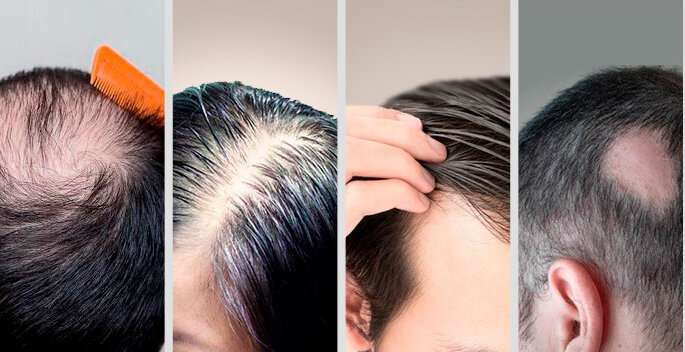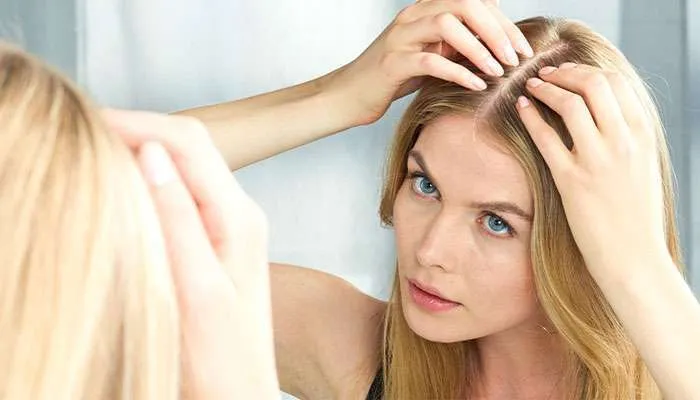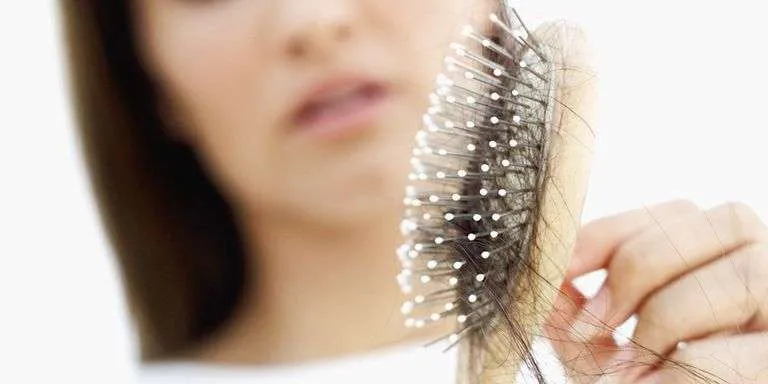Table of Contents
Hormones | Thyroid disorders | Stress | Medications | Nutritional deficiencies | Lupus | Other conditions
Hair falling out is something that everyone goes through on a daily basis. Most people lose 50 to 100 hairs per day as part of their natural cycle, with the number of hairs lost increasing on days when they wash their hair. But what if you glance at your pillow, shower drain, or comb and see that you’re losing a lot more than that?
Talking to your doctor or dermatologist is the best thing you can do. They’ll figure out why your hair falling out so much and make sure you get the therapy you need if it’s due to a medical problem.

Some of common questions about hair falling out are:
- When I pull my hair, it falls out easily!
- Why is my hair falling out after Covid?
- Why am I losing so much hair in the shower?
- My hair is falling out from the root. What can I do?
Here are a few of the possible causes of unexpected hair falling out.
Possible causes for hair falling out
Telogen Effluvium
This form of hair loss might occur three to six months after you have experienced a stressful event. These stressors, according to the American Academy of Dermatology, can include:
- Surgery
- Giving a birth
- Loss of employment or divorce
- Possessing a high body temperature
- In the process of recovering from a medical condition
According to the Mayo Clinic, telogen effluvium can cause sudden hair falling out months after a stressful event.
Alopecia Ereata
Round bald patches are a common symptom of this type of hair loss. According to NYU Langone Health, it can cause you to lose hair unexpectedly and apparently out of nowhere. The problem occurs when your immune system attacks your hair follicles by mistake. According to the American Academy of Dermatology, your hair may regrow on its own or with therapy.
Nutritional issues
Too little iron or too much vitamin A are two examples.
Hormonal Changes in your body
Hair loss is common in women after childbirth or during menopause. Hair loss can occur in women who have hormonal abnormalities.
In addition to inherited male pattern baldness, men can lose hair as their hormonal composition changes with age. The response of your follicles to the hormone dihydrotestosterone causes hair loss (DHT).
Thyroid problems
A thyroid problem is one of the most common hormone-related reasons for hair loss. Hair loss can be caused by both too much thyroid hormone (hyperthyroidism) and too little thyroid hormone (hypothyroidism). Hair loss can often be reversed by treating the thyroid problem.

Stress
Hair loss can be caused by both physical and psychological stress. Surgery, high fevers, and blood loss can all produce an excessive amount of shedding. Hair loss can occur after childbirth and last for several months.
In the case of psychological stress, the link is less clear. Many people, however, have experienced losing hair when they are under a lot of mental stress or anxiety. Hair loss can be upsetting for a variety of reasons.
Physical stress is frequently transient, and hair loss lessens as the body heals.
You can reduce mental stress by making lifestyle changes, such as:
- Regular physical activity
- A balanced diet
- Stress-reduction techniques such as meditation
- Get rid of known sources of stress in your life
Medications
Hair loss is one of the many negative effects that pharmaceuticals can cause. The most well-known cause is chemotherapy, but there are others as well:
- Anti-thyroid medications
- A few different types of oral contraceptives
- Beta-blockers
- Anticonvulsants
- Antidepressants
- Anticoagulants
These drugs have various effects on different people, and not everyone will experience hair loss. Learn about the drugs that can cause hair loss and how to avoid them.

Deficiencies in nutrition
The most common dietary causes of hair loss are zinc and iron deficiencies. Low intakes of the following vitamins and nutrients, however, may also be to blame, according to some evidence:
- Fats
- D-vitamin
- Vitamin B-12
- Vitamin C
- A nutritional supplement
- Copper
- Selenium
- Biotin
Lupus
Hair loss is a symptom of lupus, an autoimmune disease. In most cases, hair loss is patchy and accompanied by scalp sores.
Other medical problems
Other medical disorders that might cause atypical baldness include:
- Failure of the kidneys
- Irritable bowel syndrome (IBD)
- A liver ailment
- Diabetes
On the scalp, skin diseases such as psoriasis and dermatitis can obstruct hair development. Hair loss can also be caused by infections such as ringworm of the scalp and folliculitis.
It’s understandable that people who are losing their hair look for explanations and cures. Hair loss has been linked to poorer self-esteem, body image concerns, and anxiety in studies. When diagnosing hair loss, the Journal of the American Academy of Dermatology recommends checking for worry and stress.
Many of these non-genetic reasons for hair loss can be successfully addressed, preventing or even reversing hair loss.
Get Help
Hair loss can be treated in a variety of ways. Some may even be able to assist in its reversal. The best treatment for you is determined by the reason for your hair loss, which is why it’s critical to consult a specialist and have your condition diagnosed.
Don’t put it off. The sooner you address hair loss problems, the more likely you are to avoid permanent harm. To begin your journey to a fuller head of hair, speak with a medical professional now.

